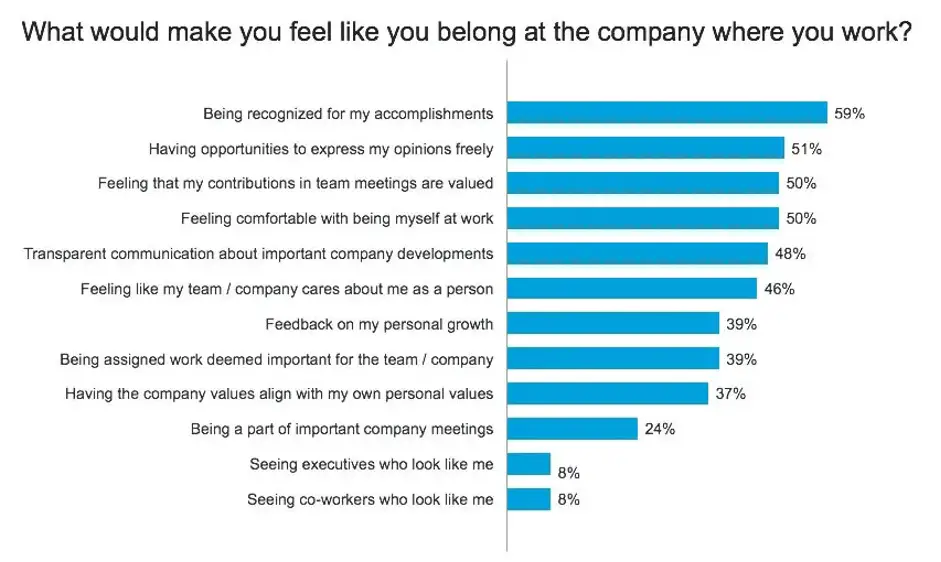How Workplace Belonging Boosts Employee Engagement & Productivity

Looking at the current workplace environment, different working models such as hybrid and remote working, alongside traditional on-site working structures are the normal. These models aim at offering workers more flexibility, while boosting employee productivity.
However, in the modern, contemporary business world where all these working models have their own benefits, keeping employees engaged irrespective of the working model employed in workplaces is emerging as a new challenge for businesses.
Engaging employees is a primary duty of business leaders as it increases productivity which leads to better performance and higher revenue for the company.
While there can be multiple factors that can assist in engaging employees, including offering more flexible working structures and schedules in the workplace, one factor is often left out from the conversations—a sense of belonging.
A sense of belonging refers to the innate need of humans to be accepted in social groups. Social groups can vary, ranging from family to friends, co-workers and religious groups.
The Value of Workplace Belonging
Businesses often forget that enhancing a sense of belonging in the workplace (by creating an environment that supports three key elements of comfort, connection, and contribution) brings many benefits that help with the growth of the company.
According to a Harvard Business Review report, a strong sense of workplace belonging in employees results in a 56% increase in job performance. Moreover, workplace belonging among employees leads to a 50% lower turnover risk.
In addition, the report found that all these benefits of workplace belonging would result in savings of more than $52 million for an average 10,000-person company. This implies that sense of belonging is vital to increase the overall profitability of companies.
In fact, despite spending billions of dollars (8 billion in the U.S. alone) each year on diversity and inclusion trainings, many businesses still miss the mark because they neglect a simple but fundamental need of workers—the need to belong.
A Sense of Belonging Is Good for Business
You cannot deny that human beings are social animals. The feeling of belonging, being valued, and involved within a group is hardwired in our DNA and is crucial for our overall happiness and wellbeing. Yet almost half (40%) of employees feel isolated in the workplace, which contributes to lower motivation, engagement, and lack of commitment.
By fostering a sense of belonging among employees, businesses can majorly contribute to increased employee engagement and productivity in the workplace. Feeling that we belong somewhere (in this case our workplaces) gives us a sense of purpose and meaning. This is crucial for life satisfaction, happiness, motivation and mental wellbeing.
Key Ways Workplace Belonging Benefits Businesses
In a study of 1,505 full-time U.S. employees, 41% of employees said that stress significantly reduces their productivity in the workplace, 33% said it made them less engaged, and 15% admitted to looking for a new job because of workplace stress.
Meanwhile, 14% said stress made them absent from work more frequently, which costs employers billions of dollars each day. Employees know they are not at their best when stressed.

Stress often occurs when work seems like a chore or an obligation for the employees, instead of an opportunity to achieve goals and grow. A possible reason for this can be the lack of feeling like they belong in the team or company as a whole.
When employees do not fit right in at work, it stresses and disengages them from their work, and work starts tofeel like a burden to them. This destroys team spirit, engagement, productivity, among other things necessary for workplace success.
On the other hand, high feelings of belonging in the workplace encourages employees to work harder with more zeal, enthusiasm, and pleasure. This leads to more success that in turn brings more joy, happiness, and satisfaction in the workplace.





















![Going On a Camping Trip? Common Problems to Prepare for [node:title]](/sites/default/files/styles/video_thumbnail_bottom/public/u134/prepare-for-common-camping-trip-problems-beforehand.jpg?itok=kMCs9P5b)